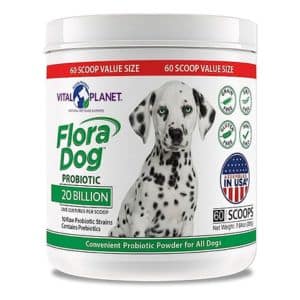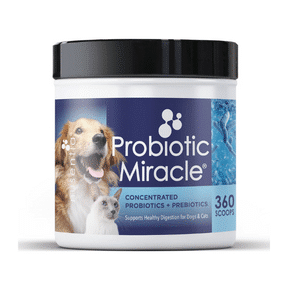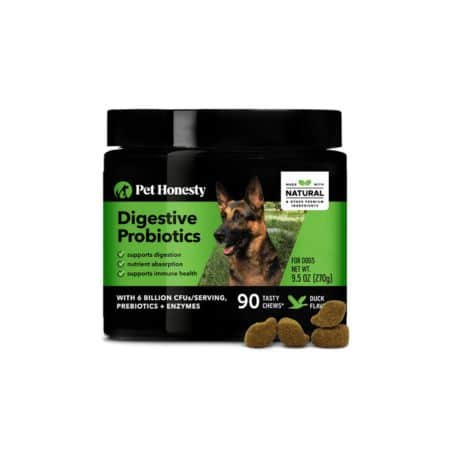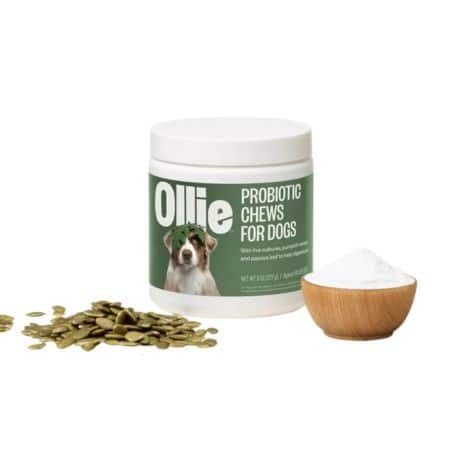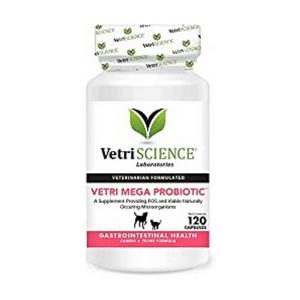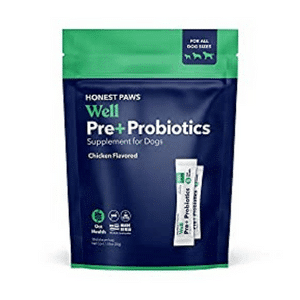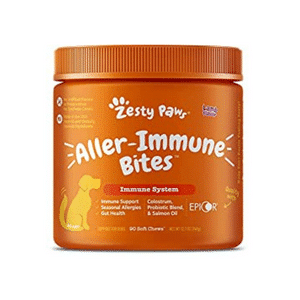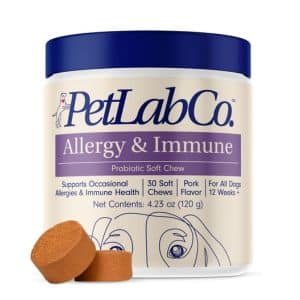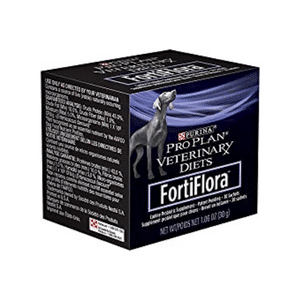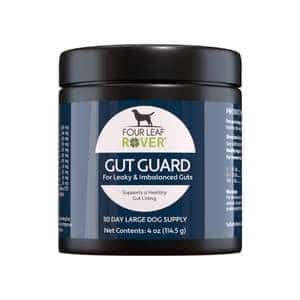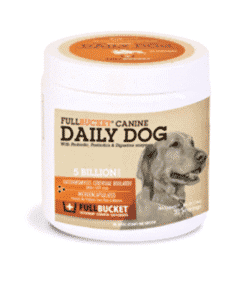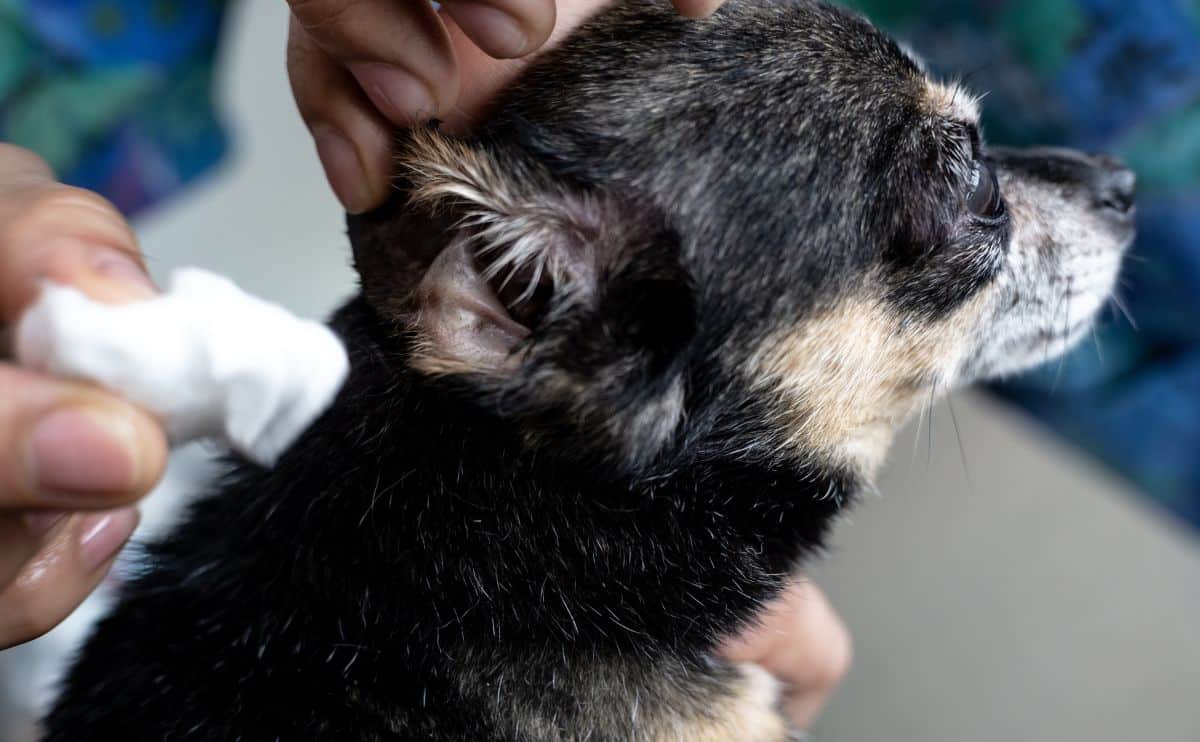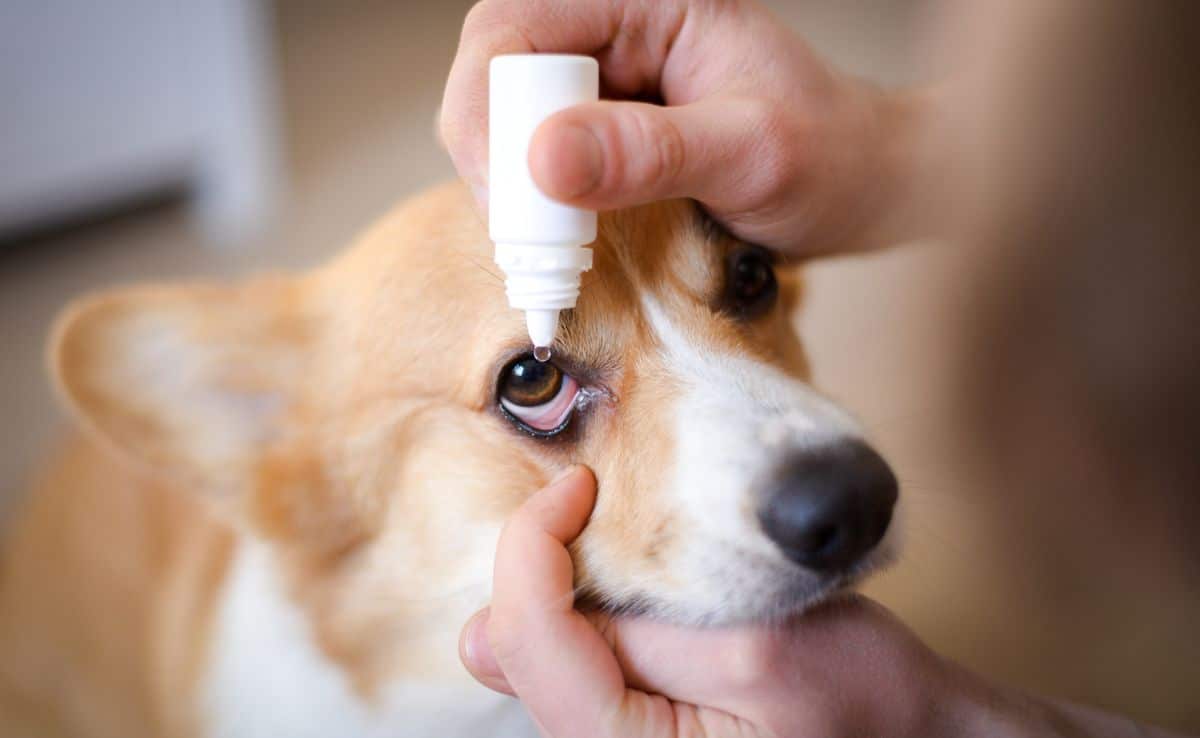Best Probiotic For Dogs: Powder, Chewable, Capsule, Calming, For Dogs With Diarrhea, Allergies & More
When you purchase through links on our site, we may earn a commission. Here’s how it works.
Human probiotics have become a health craze due to their numerous benefits, but have you considered them for your furry friend? We all know how fickle a dog’s digestive system can be. Fortunately, specially formulated dog probiotics can be a life-changer for dogs suffering from digestive and other health problems. What do you need to know about pup probiotics, and which products are your best bets? We pick the best probiotic for dogs.
Table of Contents
| Best Powder | Best Chewable | Best Capsule |
|---|---|---|
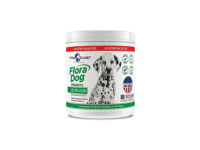 | 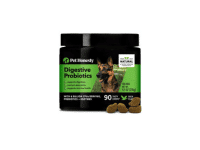 | 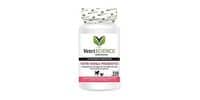 |
| Vital Planet | PetHonesty | VetriScience |
| View On Amazon | ||
| View On Chewy | View On PetHonesty | View On Chewy |
What Are Probiotics?
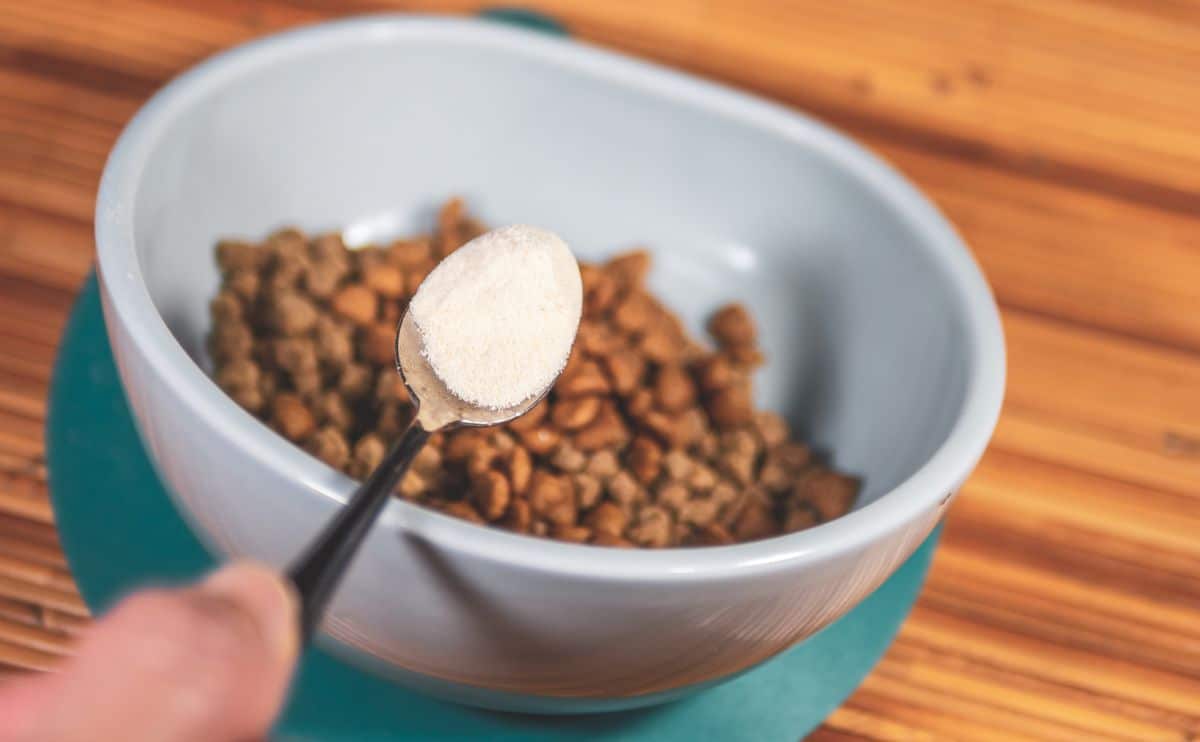
Essentially, probiotics are friendly bacteria. They make up a portion of a microbiome or a community of microorganisms living in a particular environment. The largest concentration of these microorganisms in dogs (and humans) is found in the gastrointestinal tract. Also called gut flora, this collection of microbes—bacteria, fungi, viruses, etc.—plays a crucial role in a body’s overall health and wellness.
When a microbiome is disturbed—potentially brought on by antibiotics or other medications, infectious illness, or specific diets—your dog may experience dysbiosis or an imbalance in the different types of microorganisms living in their body. Dysbiosis can have a broad effect on overall health, including a weakened immune system, digestive troubles, and nervous system dysfunction.
Gut dysbiosis has been linked to many health conditions, including:
- Acne, eczema, psoriasis, and other skin conditions
- Cancer
- Cardiovascular problems
- Chronic inflammation
- Diabetes
- Food intolerance, bloating, and gas
- Irritable bowel syndrome (IBS)
- Malnutrition
- Mood disorders (e.g., anxiety and depression)
- Obesity
Ingesting probiotic supplements replenishes healthy levels of good bacteria, thus restoring the body to a state of balance.
Benefits
Probiotics have many health benefits, but some key advantages include:
- Decreases incidences of diarrhea and flatulence
- Helps recovery from illnesses and infections
- Enhances immune response to prevent severe health conditions
- Improves anxiety and stress
- Improves bad breath
When Do Veterinarians Recommend Probiotic Use?
While probiotics can benefit all dogs, veterinarians often advise pup owners to use probiotics to treat certain conditions.
“In my practice, we recommend probiotics regularly for dogs with all sorts of stomach upsets,” says Rebecca MacMillan, BVetMed, BSAVA, PGCertSAM, MRCVS. “Some dogs only require a short course to help get their gut flora back on track after a bout of diarrhea. For other dogs with long-term digestive problems, like colitis or inflammatory bowel disease, probiotics can be a useful aid when given regularly alongside long-term diet changes or medications. There are also probiotic and fiber products that are useful for dogs with anal gland issues, where an improved stool quality can help stop the need for these to be manually emptied so often.”
MacMillan says she’s used probiotics successfully in many cases, including one dog that had ongoing intermittent loose stools and needed his anal glands manually expressed regularly. “We had ruled out other issues like parasites, so I decided to start him on a probiotic product which was successful. He continues to take this regularly, meaning we see him less often for anal gland checks! I would always advise speaking to your vet and asking them to recommend a product that might be suitable for your dog’s condition.”
What To Look For
Each dog’s health needs are different, so you want to look for a probiotic formula that contains bacterial strains that address those individual needs, e.g., intestinal infections, diarrhea, etc. For that reason, we’ve listed the probiotic blends in each product we review.
Products you’re considering should list the specific bacterial species and strains on the label, such as Bifidobacterium animalis.The best formulas include several strains to simultaneously help multiple aspects of their digestive and immune systems. Below is a summary of the best bacterial strains for dogs and their specific benefits.
Always consult your vet before giving your pup any medications or supplements.
What Is CFU?
When comparing probiotic formulas, you’ll usually notice a CFU count as a prominent “selling point. “CFU stands for “colony-forming unit,” and it quantifies how many live bacteria cultures are present.
Is a higher CFU count better? It depends. If you give your dog probiotics daily to maintain digestive and immune health, a lower CFU count should suffice (1-10 billion CFU). However, a higher CFU count is ideal for illnesses and health problems, such as inflammatory bowel disease (IBD), food allergies, after antibiotic treatment, and other cases.
Prebiotics & Postbiotics
You’ll want to look for a probiotic blend that includes a prebiotic. Prebiotics are certain compounds found in food that feed the probiotics in our gut, thus promoting a healthy microbiome. While not required in a formula, it’s a great addition. The most common types of prebiotics found in probiotic formulas include fibers like inulin, fructooligosaccharides (FOS), and oats.
In contrast, a postbiotic is the end product or what is produced from the metabolism of prebiotics and probiotics. This includes cell wall fragments, enzymes, short-chain fatty acids, and other metabolites, like vitamins. While postbiotics are an end product, some companies will include extra postbiotics in their ingredient list.
Expert Tip: Many report diarrhea or stomach upset upon starting a new probiotic regimen. However, this is common with any significant dietary adjustment—for pets and humans. So, it may be best to ease into the treatment with less than the recommended dose, allowing time for your pet’s tummy to calibrate to this nutritional change.
Are There Any Risks?
Not all dogs are the same, meaning dogs react differently to probiotics. If your dog’s microbiome is healthy, you might not notice any stark differences when starting your pooch on a probiotic. Some dogs may experience diarrhea, bloating, digestive discomfort, gas, nausea, or constipation when introduced to probiotics for the first time.
Sometimes, the symptoms can become worse before they start improving,
Best Probiotics For Overall Dog Health
We’ve chosen our top picks based on several factors, including the variety of blends, other ingredients, customer feedback, and pricing. In our reviews, we’ve noted the products that have the quality seal of approval from the National Animal Supplement Council (NASC) for safe manufacturing practices. The NASC is a non-profit trade organization that’s committed to setting standards for pet supplements, which the FDA doesn’t regulate.
Best Powder: Vital Planet Flora Dog Probiotic Review
View On Amazon | View On Chewy
We chose Vital Planet as the best powder probiotic for its combination of strains, reasonable price, and fantastic customer reviews. Vital Planet offers dog probiotics in capsules, chewable tablets, powder, and soft chews to make administering the supplement easy. Its blends are formulated by an expert team, including a veterinarian and animal nutritionist. The company also offers probiotics for cats and other supplements for hip and joint health, digestive care, and more.
The full-spectrum probiotic formula includes a prebiotic and 10 probiotic strains to help maintain normal digestive and immune function. The GI and immunity support formula includes several microorganisms used to treat different types of diarrhea, including Enterococcus faecium, Lactobacillus plantarum, Bifidobacterium animalis, and more.
Recommended use: Mix one level scoop of the powder into food once daily.
Probiotics included: Bifidobacterium bifidum, Bifidobacterium longum, Bifidobacterium animalis, Enterococcus faecium, Lactobacillus acidophilus, Lactobacillus brevis, Lactobacillus casei, Lactobacillus plantarum, Lactobacillus reuteri, and Lactobacillus bulgaricus
| Pros | Cons |
|---|---|
| Formulas contain no GMOs, grain, gluten, soy, artificial ingredients, or artificial colors | |
| Excellent for therapeutic use | |
| 20 billion CFUs per scoop | |
| Fructooligosaccharides (FOS) prebiotic | |
| NASC-certified | |
| 100% satisfaction guarantee | |
| Made in the USA |
Price
- Starts at: $29.99 ($7.65 / Count) for 30 scoops
Powder Honorable Mention: Nusentia Probiotic Miracle Review
View On Amazon | View On Chewy
Nusentia Probiotic Miracle is our honorable mention pick as the best dog probiotic in powder form for its combination of blends and overall fantastic customer reviews. This vet-recommended formula contains six different strains and a prebiotic to combat dog diarrhea, loose stool, yeast overgrowth, bad breath, constipation, itching & scratching, allergies, digestive issues, and gut-related problems.
Recommended use:
- For wellness: 1 scoop (under 50 lbs); 2 scoops (over 50 lbs).
- Therapeutic use: 3 scoops (under 50 lbs); 5 scoops (over 50 lbs).
Probiotics included: Bifidobacterium animalis lactis, Lactobacillus acidophilus, Lactobacillus rhamnosus, Lactobacillus salivarius, Lactobacillus plantarum, and Lactobacillus reuteri.
| Pros | Cons |
|---|---|
| All-natural formula with no GMOs, gluten, rice, soy, dairy, fillers, or byproducts | A few pet parents said it upset their dog’s stomach and/or caused diarrhea |
| 1 billion CFUs per scoop | Can get lumpy |
| Contains inulin prebiotic | |
| Tasteless and odorless | |
| Safe for dogs and cats | |
| Made in the USA |
Price
- $25.99 ($0.22 / Count) for 44g jar (120 scoops)
Best Chewable: PetHonesty Digestive Probiotic Chews Review
View on Amazon | View on PetHonesty
If you’re looking for an alternative to powders or pills, these PetHonesty probiotic chews with digestive enzymes help support digestive health, immunity, and nutrient absorption. They come in two flavors (duck or pumpkin) and don’t contain wheat, corn, soy, dairy, harmful chemicals, preservatives, or artificial flavoring. Each chew contains eight strains of bacteria, prebiotics, and enzymes.
Made in the USA in a Good Manufacturing Practices-certified and FDA-approved facility, you can trust you are giving your pup a safe daily supplement. They have a money-back guarantee and subscription option to save 20% on recurring purchases. You can also save 10% if you bundle three together.
Recommended use: Best when taken on a full stomach after mealtime. One chew per day per every 25 lbs of dog’s weight. Check with your vet before giving to puppies under 6 months old.
Probiotics included: Bacillus subtilis, Bifidobacterium bifidum, Enterococcus faecium, Lactobacillus acidophilus, Lactobacillus brevis, Lactobacillus fermentum, Lactobacillus delbrueckii, and Lactobacillus plantarum
| Pros | Cons |
|---|---|
| All-natural with no wheat or dairy | Some owners said it wasn’t effective for their dogs |
| Veterinarian-formulated and quality tested | |
| 3 billion CFUs per chew | |
| Contains chicory root prebiotic | |
| Fortified with digestive enzymes for better digestion and nutrient absorption | |
| NASC-certified | |
| 30-day money-back guarantee | |
| Save 20% with auto-shipping | |
| Made in the USA |
Price
You can save 20% off the following price with auto-shipping.
Full Review Of PetHonesty
Read our full review of PetHonesty supplements, including key features, pros, cons, product reviews, and more.
Chewable Honorable Mention: Ollie Probiotic Chews
Ollie, the popular all-natural fresh dog food subscription service, now offers supplements as optional order add-ons. Its probiotic chews are formulated with a blend of five probiotic strains, as well as pumpkin seed powder and papaya leaf powder, both of which are excellent sources of fiber to help regulate digestion.
All Ollie supplements are made in the U.S. in cGMP-certified facilities using a cold extrusion process to preserve the potency of every active ingredient.
Recommended use: Give one chew daily for dogs under 50 lbs and 2 chews for dogs over 50 lbs. Not recommended by Ollie for dogs under one year old.
Probiotics included: Enterococcus faecium, Lactobacillus acidophilus, Lactobacillus casei, Lactobacillus reuteri, and Lactobacillus lactis
| Pros | Cons |
|---|---|
| All-natural and non-GMO | Must have a dog food subscription to get add-on chews (but also available on Amazon) |
| Promotes healthy digestive, immune, and neurological systems | |
| 1 billion CFUs per chew | |
| Contains flaxseed and oat flour prebiotic | |
| Natural vegetarian duck flavor | |
| Made in the USA |
Our Personal Experience With Ollie Probiotics
Ollie sent our team a sample to try out in exchange for an unbiased review, and we determined that Kimberly’s dog was the best candidate to try it out.
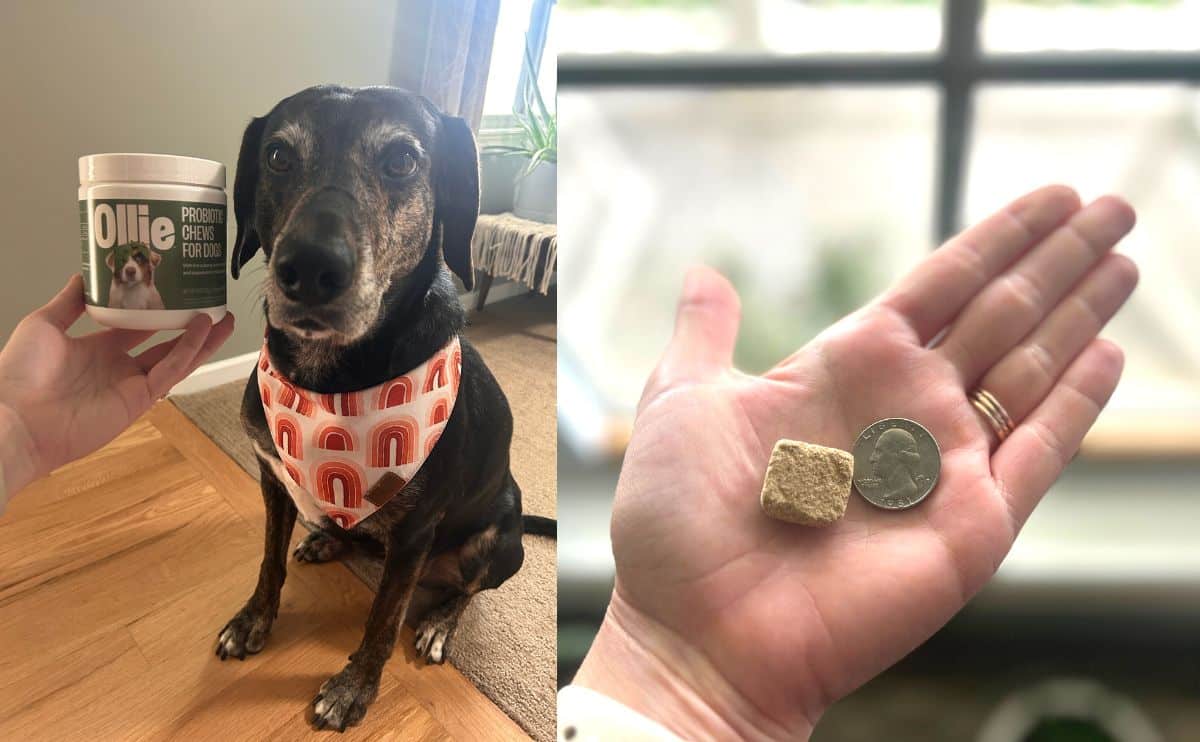
“My dog, Sally, has some anxiety and tummy issues. It’s not uncommon for us to wake up in the middle of the night to her throwing up or stepping in it when we make our morning coffee. The throw-up is always bile and never has any substance in it. We’ve tried everything to try and prevent her from throwing up, including feeding her several small meals throughout the day to help keep her tummy full, giving her a treat before bed, and ensuring she has ample exercise daily. We thought we had solved it with these steps, but it inevitably came back with a vengeance. Our vet seemed puzzled and had no strong recommendations because Sally’s vomiting was inconsistent.
I decided to look into probiotics for her. I learned that serotonin is produced in the gut, so a good microbiome can affect mood/stress. I thought a probiotic could help with anxiety, which I felt Sally struggled with, although she’s never been diagnosed with it.
Since starting Sally on a probiotic about two months ago, I can happily say that she hasn’t thrown up once. This is a vast improvement considering she would’ve thrown up several times in two months. Additionally, Sally loves the taste of Ollie’s Probiotic Chews, so it’s a fun treat for her too!
– Kimberly Alt, Parent to Sally (Coonhound mix), Canine Journal Research & Writing
Price
- $22 for 60 chews (with food subscription plan)
Full Review Of Ollie
Read our full review of Ollie, including key features, pros, cons, product reviews, and more.
Best Capsule: VetriScience Vetri Mega Probiotic Review
View On Amazon | View On Chewy
VetriScience is a well-respected canine supplement brand, and its probiotic formula doesn’t disappoint. If your dog scoffs at powder on his food, VetriScience’s capsules could be an excellent solution.
This product contains a prebiotic, seven bacterial strains, and 7.5 billion CFU per capsule. It’s recommended for supporting digestive health and issues related to food sensitivity and allergies. It also promotes a healthy immune and neurological system.
Recommended use: Give one capsule daily for dogs under 40 lbs (2 capsules for dogs over 40 lbs).
Probiotics included: Bifidobacterium bifidum, Bifidobacterium Iongum, Enterococcus thermophilus, Lactobacillus acidophilus, Lactobacillus brevis, Lactobacillus plantarum, and Lactobacillus casei
| Pros | Cons |
|---|---|
| All-natural and non-dairy | Contains rice flour (some dogs are sensitive) |
| Promotes healthy digestive, immune, and neurological systems | Several pet parents said it caused diarrhea |
| 7.5 billion CFUs per capsule | |
| FOS prebiotic | |
| NASC-certified | |
| Safe for dogs and cats | |
| Made in the USA |
Price
- Starts at $32.00 ($0.27 / Count) for 120 capsules
Honorable Mention: Honest Paws Pre+ Probiotics Review
Honest Paws, a premium manufacturer of CBD oils and CBD treats, offers a vet-formulated probiotic powder blend that contains a prebiotic, five strains of bacterial probiotics, and Solarplast, a spinach leaf extract that promotes cellular restoration and repair. Each serving contains five billion CPUs and comes in a single packet, making dosing a breeze. It’s chicken-flavored and contains all-natural ingredients.
Recommended use: Administer 1 stick per day orally or as recommended by a veterinarian.
Probiotics included: Bacillus subtilis (DE111), Bacillus coagulans, Bifidobacterium animalis lactis, Bifidobacterium longum, and Lactobacillus acidophilus
| Pros | Cons |
|---|---|
| All-natural and non-GMO | Contains rice hull and rice extract blend (some dogs are sensitive) |
| Promotes healthy digestive and immune systems | |
| 5 billion CFUs per serving | |
| Inulin prebiotic | |
| NASC-certified | |
| Made in the USA |
Price
- $29.97 ($1.00 / Count) for 30 servings
Full Review Of Honest Paws
View our full review of Honest Paws, including key features, pros, cons, product reviews, and more.
Probiotics For Specific Health Needs
Here are some of the best dog probiotics that target specific issues.
Best Probiotic For Dogs With A Sensitive Stomach: NaturVet Advanced Probiotics & Enzymes Review
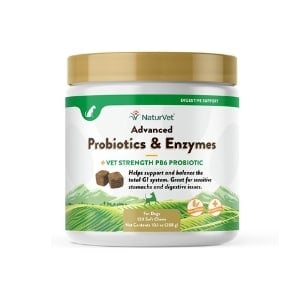
View On Amazon | View On Chewy
Many pup owners find this supplement an excellent daily aid for dogs with sensitive stomachs. Each soft chew contains 500 million CPUs of Bacillus subtilis (PB6) probiotic that’s scientifically formulated to travel through the entire GI tract. The chews also contain special enzymes such as lipase and alpha-amylase that are known to help with digestive problems. This veterinarian-formulated supplement is manufactured in the USA in an FDA-audited and CGMP-compliant facility.
Recommended use: Give daily at mealtime: 1 chew (under 20 lbs), 2 chews (21-40 lbs), 3 chews (41-80 lbs), and 4 chews (over 80 lbs). For use in dogs over 6 weeks old.
Probiotics Included: Bacillus subtilis (PB6) and Bacillus coagulans
| Pros | Cons |
|---|---|
| All-natural and wheat-free | Only contains 2 bacterial strains |
| Contains beneficial digestive enzymes | Some customers say their dogs didn’t like the taste |
| 500 million CPUs of Bacillus subtilis and 50 million CPUs of B. coagulans in each chew | |
| FOS prebiotics | |
| NASC-certified | |
| 100% satisfaction guarantee | |
| Made in the USA |
Price
- Starts at $19.97 ($1.25 / Ounce) for 70 soft chews
Best Probiotic For Anal Gland Issues: Native Pet Probiotic Review
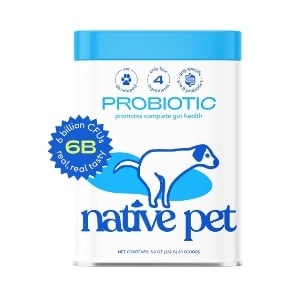
View On Amazon | View On Native Pet
Native Pet’s probiotic may be one of your best options if your pup has ongoing anal gland problems. In addition to a probiotic blend of four bacteria strains, this powder is fortified with organic pumpkin seed and organic Jerusalem artichoke (a prebiotic). These two ingredients are excellent sources of fiber that can help improve your dog’s stool quality, which is essential to minimize anal gland issues.
Recommended use: Use 1 scoop (1/2 tbsp) for every 50 lbs. of body weight daily or as needed
Probiotics Included: Bacillus coagulans, Enterococcus faecium, Bifidobacterium animalis, and Bifidobacterium bifidum
| Pros | Cons |
|---|---|
| All-natural and free of wheat, soy, and gluten | Contains beef broth (some dogs are allergic to beef) |
| Formulated by a board-certified vet nutritionist | Some customers find it ineffective |
| 6 billion CPUs in each scoop | |
| Inulin prebiotic | |
| 100% satisfaction guarantee | |
| Made in the USA | |
| Packaging is recyclable |
Our Personal Experience With Native Pet Probiotics
Our dog Barley was struggling with chronic anal gland issues so we added Native Pet probiotics to his diet to see if it would help. While his health issue turned out to be related to a chicken allergy, the probiotics did help us make the diet transition much more smoothly.
– Michelle Schenker, Canine Journal Co-Founder & Licensed Insurance Professional
Price
You can save 10% off the following price if you subscribe to auto-shipping.
- Starts at: $29.99 ($3.66 / Ounce) for 4.1-oz jar
Full Review Of Native Pet
Read our full review of Native Pet supplements, including key features, pros, cons, product reviews, and more.
Best Probiotic For Dogs With Allergies: Zesty Paws Allergy & Immune Bites Review
View On Amazon | View On Chewy
A healthy gut can help alleviate your dog’s allergy issues. Zesty Paws Aller-Immune Bites combines a five-strain probiotic formula with special ingredients to help combat more serious allergy and immunity problems.
These chewable bites contain organic licorice root, apple cider vinegar, colostrum, and vitamins, protein, fiber, and antioxidants that are clinically proven to boost the immune system. The peanut butter chews also include wild Alaskan salmon oil to support your dog’s immune system health and skin allergies.
Recommended Use: Begin with half the suggested dose and gradually work up to the suggested daily amount: 1 chew (up to 25 lbs), 2 chews (26-75 lbs), and 3 chews (over 75 lbs). Amounts can be split between AM and PM.
Probiotics included: Lactobacillus acidophilus, Lactobacillus brevis, Lactobacillus fermentum, Lactobacillus lactis, Lactobacillus plantarum, and Saccharomyces cerevisiae (yeast)
Note: Many customers say it takes a few weeks to improve allergies and itchy skin, so stick with it.
| Pros | Cons |
|---|---|
| Budget-friendly | CFU count is lower than other products reviewed here (250 million per chew) |
| Formula is free of grains, corn, and soy | A few reviews that it upset their dog’s stomach |
| Contains antioxidants, salmon oil, and flaxseed to relieve itchy skin | |
| NASC-certified | |
| 100% satisfaction guarantee | |
| Comes in peanut butter and salmon flavors | |
| Made in the USA |
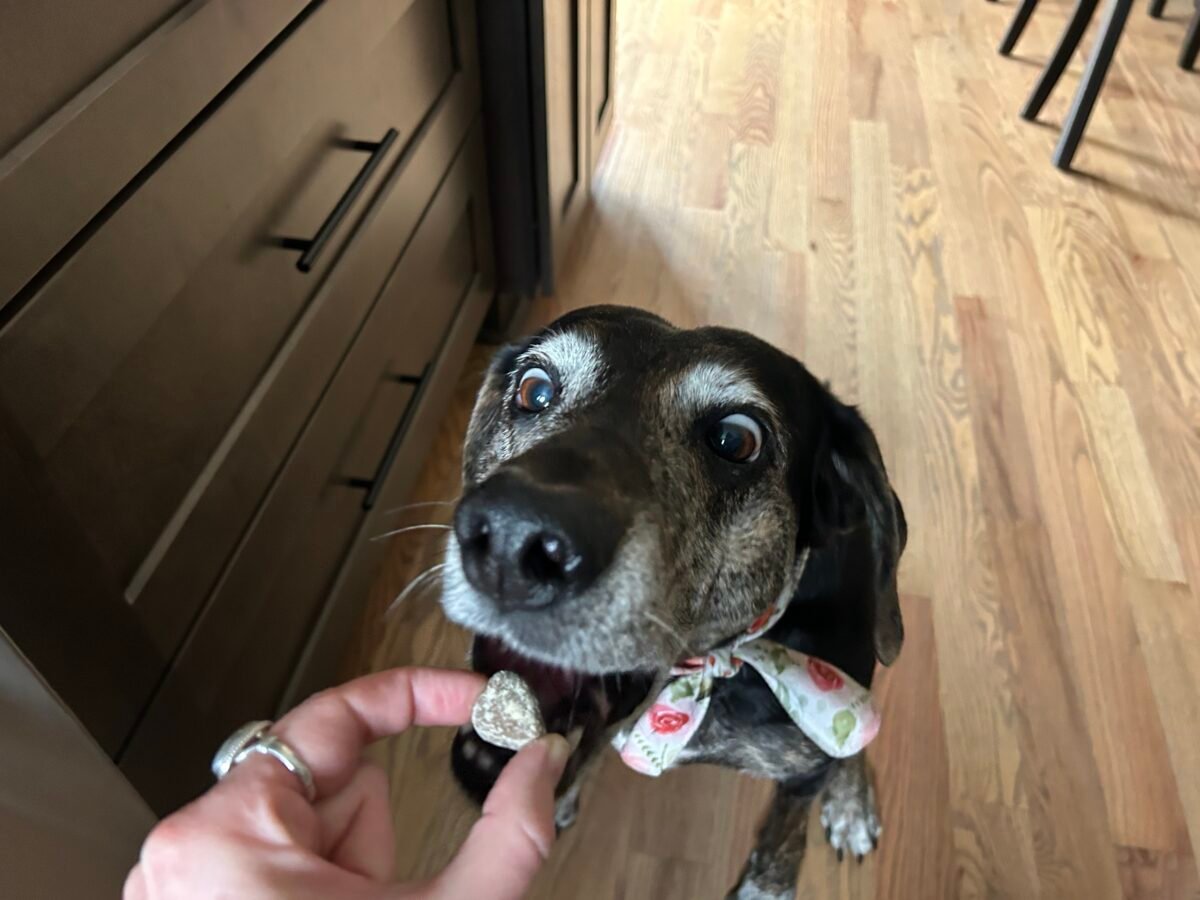
Our First-Hand Experience With Zesty Paws Allergy & Immune Bites
I started giving Sally the Zesty Paws Allergy & Immune Bites after she began licking constantly due to seasonal allergies. Within a couple of weeks, I noticed less licking and scratching, and she seemed a lot more comfortable overall.
The chews are easy to give, and I like that they support both allergy relief and immune health. These have been a helpful addition to her routine during allergy season.
– Kimberly Alt, Coonhound Mix Parent & Pet Insurance Expert for Canine Journal
Price
- $32.97 ($47.10 / pound) for 90 chews
Full Zesty Paws Review
Read our full Zesty Paws review, including key features, pros, cons, product reviews, and more.
Best Probiotic For Immune Health: PetLab Co. Allergy & Immune Probiotic Review
View On Amazon | View On Chewy | View On PetLabCo
PetLab Co.’s Allergy & Immune Probiotic soft chews are formulated with a unique blend of probiotics, prebiotics, and other key ingredients to boost your dog’s immune system, minimize seasonal allergy symptoms, and support gut health. In addition to three beneficial bacteria strains, this probiotic also contains two yeast strains that have been found to improve antioxidant activity and immune status in dogs.
The inclusion of bovine colostrum, vitamin E, and omega-fatty-acid-rich borage and krill oils further boost your dog’s immune response and help support skin and coat health. PetLab Co. also offers an excellent eight-strain probiotic for dogs.
Recommended use: 1 chew (up to 25 lbs), 2 chews (26-75 lbs), and 3 chews (over 75 lbs). Suitable for dogs 12+ weeks.
Probiotics included: Bacteria strains: Bacillus coagulans, B. clausii, and B. subtilis; Yeast strains: Saccharomyces cerevisiae and Cyberlindnera jadinii
| Pros | Cons |
|---|---|
| All-natural with no wheat or soy | Contains pork liver (some dogs are allergic) |
| Excellent blend of immune-boosting ingredients | |
| Also contains yeast probiotic strains | |
| 1 billion CPUs per chew | |
| Various prebiotics | |
| NASC-certified | |
| Made in the USA |
Our Personal Experience With PetLab Co.’s Allergy & Immune Probiotics
Watch this video to see how our dog liked their chews (for allergy & immunity, joint care, and probiotics).
Price
- Starts at: $35.95 ($1.20 / Count) for 30 chews
Full PetLab Co. Review
Read our full review of PetLab Co., including key features, pros, cons, product reviews, and more.
Best Probiotic For Dogs With Diarrhea: Purina Pro Plan FortiFlora Review
Vets have been recommending Purina FortiFlora to their patients for years to regulate dogs’ digestive systems when things go awry. This product contains 100 million CFU per gram of Enterococcus faecium and other beneficial ingredients, such as vitamins E, B, and C, antioxidants, beta-carotene, and zinc. This probiotic gets overwhelmingly positive customer reviews.
Recommended Use: Feed 1 packet to your dog daily under the supervision of your veterinarian.
Probiotic included: Enterococcus faecium
| Pros | Cons |
|---|---|
| Effective against flatulence and diarrhea | Can be hit or miss, depending on your dog’s gut makeup (since it’s only one strain) |
| Comes in pre-measured packets | Doesn’t include a prebiotic |
| Made in the USA | |
| Gets excellent customer reviews |
Price
- $30.99 for 30 individual pouches
Best Probiotic For Dogs With IBD: Four Leaf Rover Gut Guard Review
Four Leaf Rover’s Gut Guard’s special blend of probiotics, L-glutamine, N-acetyl glucosamine, and organic herbs can help control GI inflammation in dogs with inflammatory bowel disease (IBD). This vet-formulated supplement boosts healthy gut flora, breaks down hard-to-digest fibers and starches, and helps seal a leaky intestinal lining.
The formula’s organic herbs, such as licorice root, aloe vera, chamomile, dandelion root, ginger root, and burdock root extracts, have exceptional anti-inflammatory properties to soothe the gut of dogs with IBD. Gut Guard is also an excellent probiotic for dogs with other GI problems, including sensitive stomachs, diarrhea, bloating, and gas.
Recommended use: At mealtime, give once daily for healthy dogs and twice daily for immune support (or as directed by your vet.) Dosing: 1/4 tsp (5-25 lbs), 1/2 tsp (25-50 lbs), 1 tsp (50-75 lbs), 1-1/2 tsp (75-100 lbs), and 2 tsp (over 100 lbs).
Probiotics included: Bacillus coagulans, Bacillus subtilis, and Pediococcus acidilactici
| Pros | Cons |
|---|---|
| All-natural, non-GMO, and organic | Only has 3 strains of bacteria |
| Excellent blend of anti-inflammatory ingredients | |
| 6 billion CPUs per 1-1/2 teaspoon scoop | |
| Contains prebiotic burdock root | |
| NASC-certified | |
| 30-day satisfaction guarantee | |
| Formulated by a holistic veterinarian |
Price
- $39.99 ($39.99 / Count) for 30 large dog doses
Best Probiotic For Dogs On Antibiotics: FullBucket Review
View On Amazon | View On FullBucket
FullBucket has a yeast-based powder probiotic that’s an excellent option if your dog is taking antibiotics. Each serving contains five billion CFUs of Saccharomyces cerevisae boulardii, a yeast probiotic that antibiotics won’t kill. It can be especially helpful in preventing antibiotic-associated diarrhea.
This all-natural product also contains a prebiotic, digestive enzymes, and L-glutamine, an important amino acid that helps support a healthy GI lining.
Recommended use: One scoop added to your dog’s food with each meal for adult dogs (1/4 scoop for puppies).
Probiotic included: Saccharomyces cerevisae boulardii
| Pros | Cons |
|---|---|
| Ideal for dogs taking antibiotics | Doesn’t contain any bacterial probiotic strains |
| All-natural, vegan, gluten-free, and non-GMO | Some users say it wasn’t effective for their dogs |
| Save 20% with auto-shipping | |
| 100% 1-year money-back guarantee | |
| Made in the USA |
Price
With auto-shipping, you can save 20% off the following price. Plus, you get free shipping on orders over $50.
- Starts at $121.13 ($7.90 / Ounce) for one jar (150 servings)
Most Beneficial Bacteria Strains For Dogs
The bacterial species used most frequently in probiotics for dogs are Bifidobacterium and Lactobacillus.
- Bacillus coagulans are soil-based bacteria that are resistant to destruction from stomach acid. It’s been shown to help with stool quality, nutrient absorption, diarrhea, gas, and overall intestinal and immune health in dogs.
- Bacillus subtilis has been found to improve stool texture and odor in dogs.
- Bifidobacterium animalis is naturally found in your dog’s large intestine. It helps to improve overall intestinal health, prevent inflammatory activity and infection, and resolve canine diarrhea.
- Lactobacillus acidophilus promotes antibacterial and antifungal properties in the GI tract. It also helps prevent diarrhea associated with antibiotics. Finally, it may help reduce cholesterol levels and improve growth in puppies and younger dogs.
- L. fermentum, L. rhamnosus, L. salivarius, L. reuteri, L. plantarum, and L. casei are all critical in the healthy canine gut. They provide anti-microbial properties in the GI tract and help improve intestinal problems. L. reuteri has been shown to help control canine intestinal infections.1
- Enterococcus faecium aids in digestion and helps to maintain a healthy mix of bacteria in the dog’s stomach. It also helps protect against Shigella, E. coli, Salmonella, and other pathogens.1
- Pediococcus acidilactici is used to treat constipation and diarrhea, relieve stress, and enhance the immune response. It’s also known to protect the small intestine from pathogens, such as E. coli and Salmonella.
How To Care For A Probiotic Product
Unless stored appropriately, probiotics can die before your pet has a chance to take them. Although you need to follow the specific package instructions on the particular product you purchase, most probiotics need to be stored in a cool, dry place in a tightly sealed container. Depending on the packaging, some probiotics must be kept in the refrigerator.
The problem with probiotics is that they are living microorganisms that live in the digestive tract, meaning they require certain conditions to survive. Exposure to extreme temperatures, moisture, and air damages their viability. For example, leaving them in a hot car for a few hours means that they probably will not survive. And they certainly won’t be as effective as they should be.
Want To Discover Your Dog’s Gut Health?
If you suspect your dog’s digestive distress could be due to an unbalanced gut, you may want to give him a gut microbiome test. We recommend AnimalBiome’s at-home gut health test kit that analyzes a small stool sample to determine the makeup of good and bad bacteria in your pup’s gut microbiome. You can then share the results with your vet to determine a treatment plan.
Frequently Asked Questions
Here are some questions our readers often ask about dog probiotics. If you don’t see yours, ask us in the comments.
Can Dogs Take Human Probiotics?
Yes, dogs can take human probiotics. The majority of probiotic strains you’ll see in human formulas are the same as those in pet formulas. That being said, giving your dog a dog-specific probiotic may be more beneficial since the formulas will be more fine-tuned to your pet’s needs. Keep in mind that human probiotic products could also contain other ingredients that may be harmful to dogs, such as added herbs, so it’s wise to go with a doggy blend.
Can Puppies Take Probiotics?
Yes, older puppies can take probiotics formulated for dogs. What’s the best probiotic for puppies? Most of the products we review here are safe and beneficial for puppies. Just follow the safe starting age (typically eight weeks) and serving size for your puppy’s weight.
Are There Natural Probiotics For Dogs?
A natural source of natural probiotics for dogs is yogurt or kefir. You’ll want a product high in live cultures with no added sugar or artificial sweeteners. Added sugars aren’t healthy for dogs, and some artificial sweeteners, like xylitol, are toxic for dogs. Also, plain, Greek-style yogurt is better because it has lower levels of lactose, which can cause digestive issues in some dogs.
Fermented vegetables can also be a healthy source of natural probiotics for dogs, but you want to ensure they don’t contain onions, garlic, or chives, which are toxic for dogs. See which foods are and aren’t safe for dogs.
My Dog’s Symptoms Are Not Improving. Now What?
Unfortunately, some dogs’ symptoms might become worse before they get better. If your dog’s symptoms are ongoing or they get worse, you need to make an appointment with your vet. It’s also worth remembering that there is no one-size-fits-all approach. And there isn’t a probiotic product out there that cures all digestive problems in every dog.
Does My Dog Have To Use Probiotics All Of The Time?
Many dog owners choose to give their dogs probiotics daily for ongoing immune and digestive support. That being said, you can also choose to give your dog probiotics only when symptoms arise.
Other Ways To Remedy Digestive Problems
Besides adding probiotics to your dog’s diet, there are other things you can do to treat your dog if he’s suffering from chronic GI problems. First, check out our tips to cure a dog’s upset stomach.
You may also want to consider switching your dog’s diet. Several companies specialize in all-natural, high-quality dog food blends formulated to address GI problems and allergies. And they deliver right to your door. Read our reviews of the best dog food subscriptions to learn more.
Sources: [1] Doggy’s Digest
Why Trust Canine Journal?
Tara is a writer for Canine Journal, specializing in health and nutrition. She has worked in the wellness industry for 7+ years, advising pet parents on supplements and nutrition for their furry friends. Tara spends countless hours vetting companies and their products for quality, such as checking ingredient sourcing, product purity, and sustainability.
